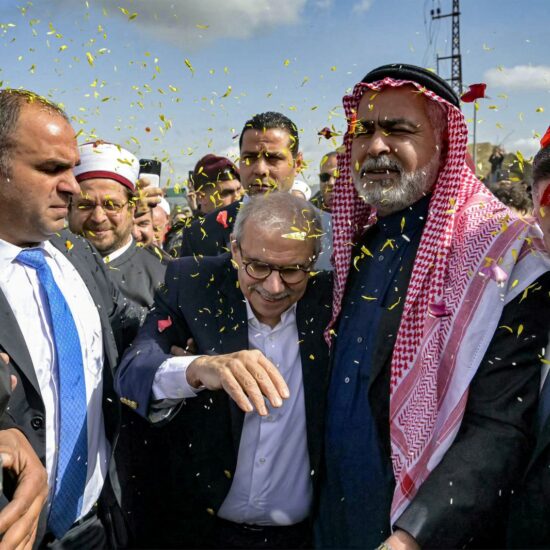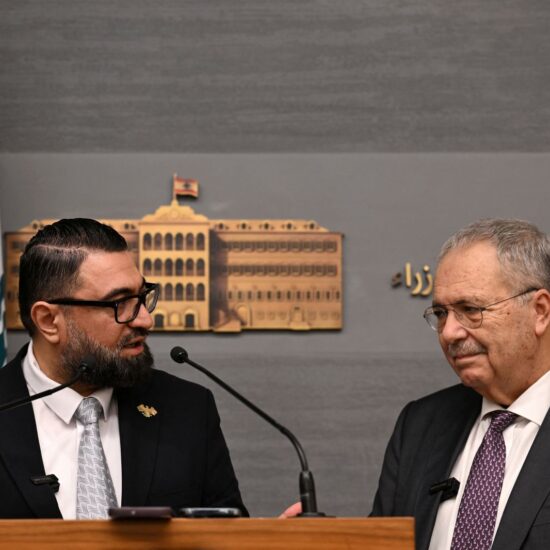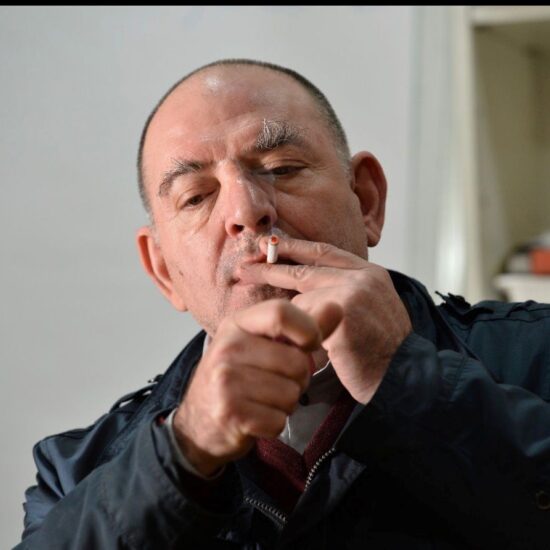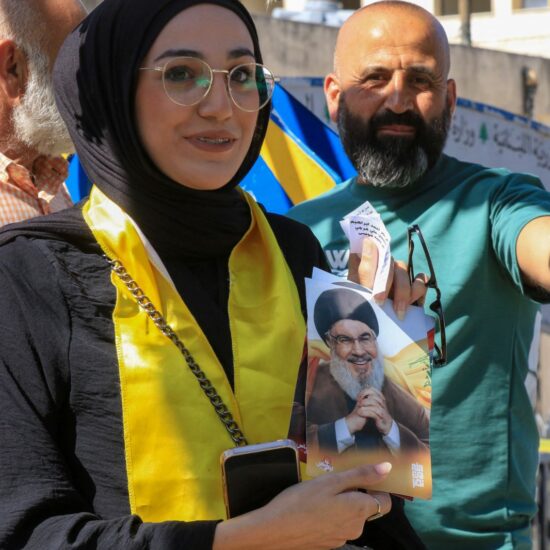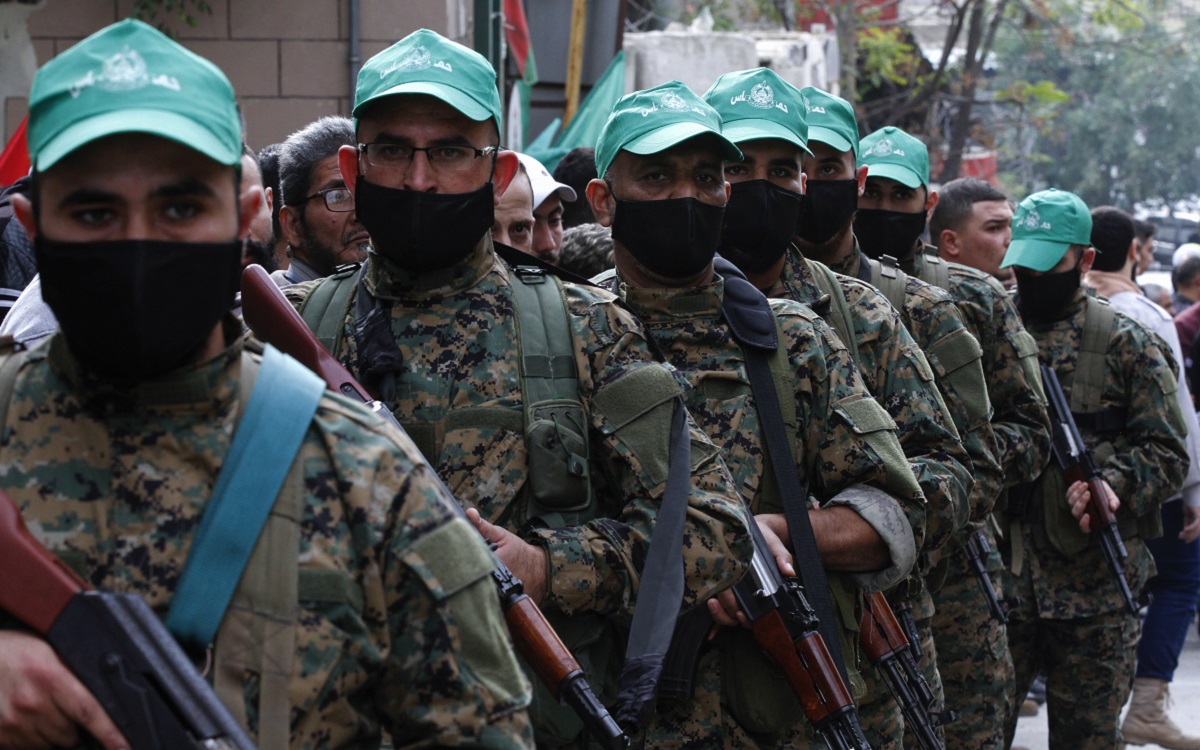
I know the international system is supposed to be anarchic. Formally, it is. Informally, however, in practice, it’s a patron-client system, where small and developing states navigate informal subordination mechanisms.
Obviously, sovereignty is one thing, dependence is another. Sovereignty is a concept that belongs to the formal sphere of international relations, a principle that should not be compromised. It has to do with the state holding monopoly over the use of weapons and violence to ensure law and order. When a state gives up that right, it’s no longer a state. When it partially gives up that right over various patches of territory, it may survive as a state, but it will be constantly fearing for its existence and over-policing the areas it is able to control.
In Lebanon, the problem is that the principle of sovereignty, that prerogative of one state to use violence to maintain law and order on the territory it governs, is at stake.
Also, in Lebanon, the violation of sovereignty is misunderstood and equated by some commentators with informal relations and practices, diplomacy and negotiations that are normal for a global world. That is part of the transactional, where things change, mutate.
The informal side of international relations, whether we look at it from a global or regional perspective, is made of pyramids where smaller and weaker states adhere to the ideology of stronger, more developed states. The reasons are various, there is a large variety of situations: there is informed consent, there is blackmail, there is threat, but there are also charm and soft power.
In short, having a proxy army is a matter of violation of sovereignty just like air raids by an enemy army. If the country’s land is sacred, sovereignty is sacred. They transcend. If they no longer transcend, they become part of the transactional: everyone will want a proxy army in one form or another and the state will not be able to argue coherently for allowing one proxy army but not another to police certain territory.
Political influence, accepting France’s help or US help, negotiating with the Gulf, pressure to enforce rule of law and complete investigations, liberal freedoms versus theocratic norms, allowing press conferences, and then apologizing, are matters of the transactional.
No one is immune to trading influence. But they should be rejecting a non-state military presence that restricts citizen rights in various regions, that doesn’t answer before the state law, and, when it suits it, it doesn’t recognize state law at all. Because sooner or later its presence will tear the whole country apart.
Bottom line is – if Hezbollah can compromise Lebanon’s sovereignty, no one will ever see it as inviolable again. Without Hezbollah’s knowledge and permission in South Lebanon, Hamas could not have stored anything, be it oxygen or anything else, under a mosque, in an overcrowded refugee camp. And there is nothing any state institution can do to investigate it, leaving everything to everyone’s imagination.
The explosion
One man died after being injured on Friday night when an explosion rocked Bourj al Shemali Palestinian refugee camp in the vicinity of Tyre, South Lebanon. The immediate explanation for the deflagration that came from sources in the Lebanese security institutions (they never speak on the record) was that an arms depot in the basement of a local mosque exploded after a nearby fuel tank had caught fire.
Friday night’s explosion also left a few people wounded, said a Palestinian official in the camp.
Oxygen: Hamas denied the initial media reports that an arms depot had blown up.
“An electrical short circuit in a storage depot containing a quantity of gas and oxygen canisters for coronavirus patients” caused the blast, it said. “The fire caused damage to property but the impact was limited,” it said, without detailing casualties.
The explosion, which blackened the walls and shattered windows of a nearby mosque, was caused by an electrical short circuit that sparked a fire in a store containing the oxygen tanks, it said in a statement.
Officially, Lebanon hosts some 192,000 Palestinian refugees, most of whom live in the country’s 12 camps, according to the United Nations Relief and Works Agency (UNRWA).
Unclear: If there are more victims, noone really knows. But someone blamed the Islamist organization for the explosion that might have done more damage than any media outlet was able to verify.
The shooting: Someone opened fire on Sunday on the funeral procession of the Hamas militant who died on Saturday after sustaining wounds in the explosion. Hamas official Raafat al-Murra said militants from the rival Fatah movement “shot at the funeral procession.” Three Hamas militants were killed, six people were wounded, he added.
Talal al-Abed Kassem, an official from security forces affiliated with Fatah in the camp, said that “the shooter is neither a member of the Fatah movement nor the security forces”, Lebanon’s National News Agency reported.
Over a decade of skirmishes: Hamas and Fatah, the secular party led by Mahmoud Abbas, have been at odds since 2007 when the Islamists seized Gaza after a week of deadly clashes.
The Lebanese army said later that Palestinian security officials had handed over a Palestinian man accused in the shooting and that an investigation had been opened.
Hamas late Sunday issued a statement that blamed security forces of the Palestinian Authority, which is led by Abbas. Those forces held “direct responsibility” for what it said was “murder and assassination”, and that PA security forces in Lebanon and leadership in Ramallah were “fully responsible for this crime”.
Reactions: Lebanese Forces leader Samir Geagea asked Sunday for an official version from the Lebanese authorities concerning the explosion that took place Friday evening.
As a reminder, the Christian leader was summoned for investigation after the October 14 clashes between some LF supporters and Hezbollah and Amal gunmen, with the Lebanese Army also caught in the middle.
We’re not going to hold our breath for any investigation to take place and for any results to be made public in a spurt of transparency from the Lebanese state.
The right to work: Labor Minister Mustafa Bayram finalized last Wednesday a decision to grant Palestinian refugees the right to work in Lebanon. Many Palestinian refugees born and raised in Lebanon are doctors, lawyers and nurses, but are unable work in the managerial, business, tourism, industrial, information, health, education and service sectors. Most were employed illegally and underpaid.
The decision announced by the minister was met with criticism from the Christian right, historically opposed to Palestinian presence in Lebanon.
The new ministerial decision includes “Palestinians born in Lebanese territories, born to a Lebanese mother or married to a Lebanese citizen, and non-registered Palestinians who were born in Lebanon”. It forbids them from joining state security services or free profession syndicates.
A fisheye view of the region
The first visit: Israeli PM Naftali Bennet made the headlines when visiting the UAE and meeting the crown prince, but no one mentioned Iran in any media report about the meetings. The UAE was one of the Gulf countries that broke ties with Lebanon after Saudi Arabia got angry at Hezbollah’s grip over state institutions. Only the Israeli ambassador said the topic of Iran was on the agenda.
Bahrain complains: A group of Bahraini opposition activists held a press conference in the southern suburbs of Beirut last week to criticize the rapprochement between the government in Manama and Israel. The Kingdom of Bahrain issued a complaint on Sunday and sent it to the Lebanese Ministry of Foreign Affairs. Lebanese PM Najib Mikati issued an apology.
A step closer to normalization: Syria opened the border crossings with Lebanon, which had been closed due to the Covid -19 pandemic. Jordan also announced in September it had opened the border with Syria. Syria agreed to transfer Egyptian gas and Jordanian electricity to Lebanon through its territory. It remains unclear when Lebanon will start importing the resources, given the fact that the electricity grid, as well as the gas pipeline, have been damaged during the war in Syria and need serious repairs.
The Beirut Blast probe
Arrest warrant: Beirut port blast chief investigator Tarek Bitar called on Friday for the immediate arrest of former finance minister Ali Hassan Khalil.
The investigation into the massive explosion at Beirut port on August 4, 2020 resumed Wednesday after a two-month hiatus caused by multiple lawsuits seen as seeking to hamper the work of judge Tarek Bitar.
Complaint to the UN: Several suspects in the Beirut port explosion case claimed that the Lebanese government was detaining them arbitrarily and illegally, filing a complaint to the United Nations on Friday, to protest their detention since August 5, 2020 “without any reason other than that they occupy their current or previous positions.”
The complaint was filed by Head of Customs Badri Daher, former Head of Customs Chafic Merhi, port Director-General Hassan Koraytem, customs authority director Hanna Fares, all of whom knew about the presence of the ammonium nitrate in the Beirut port before the explosion.
Meanwhile, in a different court: Former Byblos MP and general secretary of the March 14 alliance Fares al-Souaid was called in for investigation after Hezbollah filed a complaint against him for defamation and inciting to civil war. The reason for Hezbollah’s complaint was that Souaid tweeted on September 6 and 18 that Hezbollah was responsible for the Beirut port blast.
His interrogation was postponed on Monday due to a strike of court employees.
Elections corner
Probably in May: Minister of Interior Bassam Mawlawi told Egyptian agency MENA that Lebanon’s legislative elections will most probably take place in May. The reason is that President Aoun, who has rejected the March 27 date set by the parliament, would not sign a decree before December 27. To be able to hold the poll on March 27, the decree needs to be signed at least three months before.
Whenever, wherever: Hezbollah also said they want elections, whenever they may happen. MP Hassan Fadlallah said the party didn’t yet choose candidates.. but they will be announced as soon as the leadership makes a decision.
In other news
Telecom on strike: Employees of the companies Alfa and Touch, the only mobile telephony companies in Lebanon, have announced an open-end strike starting on Monday in protest of “infringements on their rights, including the lack of health coverage amid a grueling economic crisis”. The employees gathered in front of the headquarters of each company, halting all customer services and closing down official retail stores.
The mobile telephony companies remain among the few that still provide subsidized services at the 15,00 LBP/US$ rate.
Another nosedive for the pound: The Lebanese currency plummeted on the market Thursday after the central bank raised the exchange rate for US dollar deposits held in the country’s banks. The exchange rate for US dollars was raised from 3,900 to 8,000 Lebanese pounds.
This new parallel rate affects dollar deposits that have been trapped in Lebanese banks by a capital controls policy that prevents people from withdrawing their savings. Depositors will now be allowed to withdraw limited amounts of their dollar deposits in Lebanese pounds at double the previous rate.
No progress: The Parliament rejected a capital control bill last Wednesday, after pressure from depositors’ associations.
The first two Omicron cases: The Lebanese health ministry said Thursday that it had confirmed the country’s first two cases of the Omicron variant of Covid in passengers tested upon arrival at the airport.
Detention of a journalist: Lebanese authorities released US journalist Nada Homsi last Wednesday, after several human rights organizations, including Human Rights Watch and Amnesty International, called for her to be let go. Nada Homsi, a freelance journalist currently working with National Public Radio (NPR), had been arrested by the Lebanese General Security on November 16 following a raid on her apartment that took place without a judicial order, Amnesty International and Human Rights Watch said in a joint statement. She was held on security charges. The General Security released a statement explaining why she was held. Homsi dismantled them all. One by one.
A big deal out of satire: On Tuesday, citizen Jean-Paul Samaha filed a complaint before the public prosecution office against activist Amani Danhash, a.k.a Ammounz, for “disrespecting the presidency of the republic,” adding that he is doing so because he is “a citizen with dignity.”
The case was transferred to the Criminal Investigation Department. The reporting follows several campaigns launched by FPM supporters against Ammounz since the October 17 uprising, Megaphone reported. One campaign went as far as demanding that the company which employs her in Dubai should fire her.
Lebanon+:
#metoo growing in Lebanon: Harassment cases have been making headlines more often in Lebanon, after the first case ever to make it to court.
Lats week, students in Tripoli protested against a teacher accused of sexual harassment, demanding his dismissal. The Ministry of Education announced they would assign a new principal for the high school in North Lebanon.
In South Lebanon, a scuba diving teacher has been accused of harassment.
Acknowledgement: Monika Borgmann, filmmaker and co-director of UMAM Documentation and Research, a Lebanese NGO that focuses on issues related to civil violence and the collective memory of the Lebanese civil war, was awarded the Franco-German Human Rights Prize.
Very glad to receive the Franco-German Human Rights Prize for @UMAM_DR and @LokmanSlim !!!@GermanEmbBeirut @grillo_anne @AmbaFranceLiban @GermanyDiplo
Photo: @MarwanTahtah pic.twitter.com/JEd1HWIXFv
— Monika Borgmann (@MonikaBorgmann) December 12, 2021
Podcasts: Many podcast hosts have already started their holiday vacations. Only Sarde after Dinner hosted Big Hass, the host of Laish Hip Hop, the first and only Hip-Hop show in Saudi Arabia.
But among the best podcasts I have listened to this year, is Mike Azar’s 6:08, which he read on The Beirut Banyan. Brace up, it will take its toll on you. He recorded it on the one-year anniversary of the Beirut blast. It may be triggering, but it was also necessary. For him to heal, and for us to remember.
Until next week, stay safe. Follow NOW Lebanon on Twitter, Instagram, Facebook, and LinkedIn, and subscribe to our weekly newsletter.




